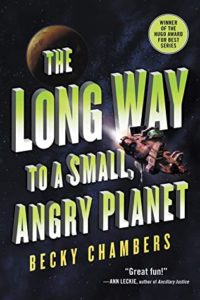
For the last couple years, the list of recent speculative fiction that everyone else seems to have read but that I hadn’t started with Becky Chambers’ The Long Way to a Small, Angry Planet. But when the most recent book in her Wayfarers series was nominated for the Hugo Award for Best Novel, I finally got the push I needed to move the series to the top of my TBR.
Wayfarers has reached the point where it’s hard to jump into the series without having a pretty good idea of what to expect: various races together on a spaceship, strong found family themes, no driving central plot, and a series of conflicts that can be solved by good communication and caring for one another. And while I think the ease of the conflicts might have been oversold a bit, that’s about right. We open with perspective from a human named Rosemary who takes an administrative job on a tunneling ship (they essentially build wormholes), but we eventually get perspective from pretty much everyone aboard as they make the long journey to the site of their most lucrative contract yet.
The Long Way to a Small, Angry Planet may not have a driving central plot, but neither is it just a series of vignettes in the lives of the central cast. Obviously, sometimes the unexpected happens, but quite a few of the conflicts are set up early and marinate for hundreds of pages before taking center stage, from Rosemary hiding her identity after things go sour with her rich Martian family to an engineer risking imprisonment for the sake of his love of an AI to a navigator with a virus that gives them unprecedented abilities to see beyond three-dimensional space while also slowing killing them.
Unfortunately, some of the conflicts with the longest arcs have some of the least satisfying resolutions. The book flirts with ends justifying the means, trying to skirt moral complications by assigning unsavory actions (with what are perceived as positive consequences) to one of the less scrupulous characters. And the AI storyline that feels like it’s supposed to pack one of the biggest emotional punches just never totally landed for me. To be honest, the book’s reputation for coziness led me to believe it would avoid emotional punches entirely, and I think the overwhelming sense of optimism by the general readership suggests that I’m not the only one who didn’t find the scenes that seemed designed to be be hard-hitting to fall short of the mark.
The characters themselves, on the other hand, are a real strength. I’d expect to connect to just one or two major characters in a single book, but we’re introduced to an ensemble cast of nearly ten, and every single one has a well-defined personality and a particular conflict that moves them deeply. It’s impossible to avoid some characters being presented more effectively than others, but I felt by the end of the book that I’d seen robust arcs for more than half of the cast, and even those with less-effective arcs were at least characterized well enough that they didn’t blend together. In hitting so many arcs, the book does sacrifice some depth, with resolutions more often than not coming within a chapter or two of climax, but—leaving aside my two criticisms in the previous paragraph—it’s a balance that generally works well.
Overall, I think the conventional wisdom about The Long Way to a Small, Angry Planet is largely correct. It introduces an excellent cast and a host of small, interconnected plot arcs that don’t go especially deep but still deliver satisfying resolutions. However, I did feel that the book was aiming for more emotional weight than it delivered, leading to an ultimate climax that didn’t quite feel earned. And if this were the sort of book where everything drives to that ultimate climax, it’d be the sort of flaw that undoes so much good work. But in a book that’s made up of so many smaller character moments, one or two failing to land doesn’t keep it from being a really solid read.
Recommended if you like: various species learning to live together.
Can I use it for Bingo? It’s hard mode for Set in Space, Award Finalist, and Family Matters, and is also on the LGBTQIA List and has a number of Non-Human Protagonists.
Overall rating: 15 of Tar Vol’s 20. Four stars on Goodreads
